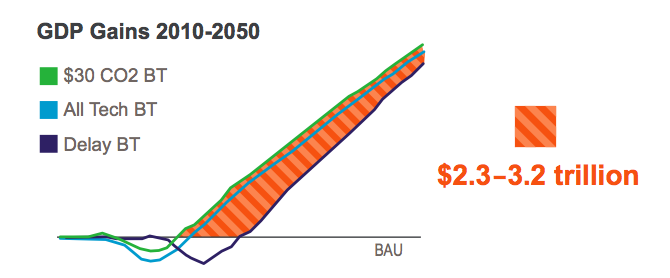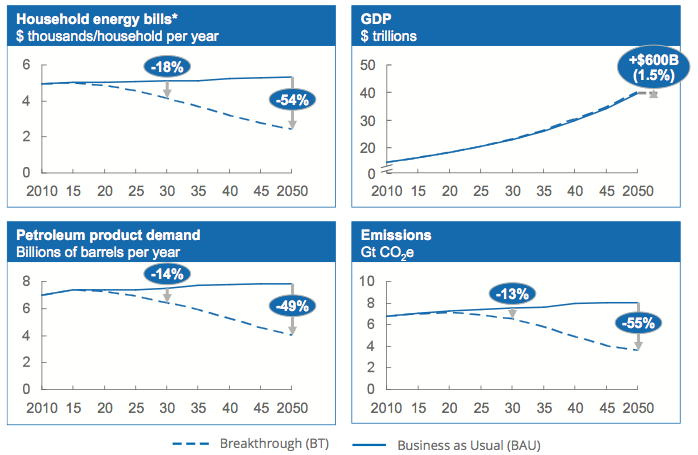Cross-posted from Climate Progress.
Google, a leader of innovation in the digital economy, says that without a private and public focus on innovation in renewables, storage, and electric vehicles, the cost of delaying the clean energy economy could be in the trillions of dollars to the U.S. economy.

Google released an analysis of the economic impact of clean energy innovation today, modeling a variety of long-term scenarios and their influence on GDP growth, energy costs, and greenhouse gases. They used McKinsey’s Low Carbon Economics Tool, which provides models to assess the macroeconomic impact of climate and energy policies:
Based on our modeling, we estimate that by 2030, innovation in the modeled technologies alone could have a transformative impact on the US, adding over $155 billion per year in GDP and 1.1 million net jobs, while reducing household energy costs by $942 per year, oil consumption by 1.1 billion barrels per year, and GHG emissions by 13% relative to BAU. By 2050, annual gains in GDP increase to $600 billion, net additional jobs to 3.9 million, and emissions reductions to 55%.

But delaying this “innovation arms race” by as little as five years with inconsistent policy that slows private investment (a delay not unlikely in the U.S.) could result in $2.3-$3.2 trillion in unrealized GDP gains — costing the U.S. over a million new jobs and preventing the reduction of up to 28 gigatons of CO2.
This study also highlights another important point: It will take far more than clean energy innovation to substantially reduce greenhouse-gas emissions. The most optimistic Google models only enable electric vehicles, energy storage, and renewables to reduce U.S. greenhouse-gas emissions by 49 percent compared with 2005 levels. This study doesn’t address some of the other core climate solutions like building efficiency, demand response, advanced materials, and agriculture.
The study also makes clear that innovation goes hand-in-hand with smart energy policies, including mandates for efficiency and renewables to accelerate deployment:
Policies can also amplify the economic, security, and pollution benefits of breakthroughs by creating markets, dis-incentivizing the highest-emitting technologies, and leveling the playing field for clean energy, leading to increased adoption.
The bottom line is that innovation plus policy (mandates or a carbon price) “has the best overall outcome.”



